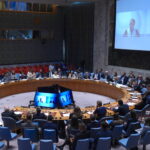The amendment, led by Sen. Joni Ernst, highlights the ‘serious and growing’ missile threats from Iran and its proxies

Kevin Carter/Getty Images
U.S. Capitol Building on January 18, 2025 in Washington, DC.
The Senate Armed Services Committee’s draft of the 2026 National Defense Authorization Act, passed out of committee this week, includes provisions aimed at furthering coordinated air and missile defense efforts in the Middle East.
Moves to strengthen military cooperation among the U.S., Israel and Arab countries have been part of several recent NDAAs, starting with the DEFEND Act, which first pushed for coordinated air and missile defense efforts in 2022, as an outgrowth of the Abraham Accords.
The new amendment, led by Sen. Joni Ernst (R-IA), a co-chair of the Abraham Accords Caucus, instructs the Defense Department to submit to Congress a new report on implementing integrated air and missile defense infrastructure in the Middle East, including an assessment of threats; a summary of U.S. priorities and capabilities; and lessons learned from the Iranian ballistic missile attacks on Israel and the Houthi attacks in the Red Sea.
The amendment highlights the “serious and growing” missile threats from Iran and its proxies, which puts U.S. forces and allies in danger, and states that the U.S. has an “obligation” to protect its own forces and its partners.
“My DEFEND Act created unprecedented cooperation between Israel and its Abraham Accords allies and has played an intricate role in defending against missile attacks from Iran and its network of terrorist proxies,” Ernst said in a statement regarding the amendment. “October 7th was a reminder that our enemies are constantly evolving and scheming new ways to carry out their malign ‘Death to America’ mission. We must stay one step ahead and ensure that America and our partners are fully equipped and prepared to defend themselves in the post-October 7th world.”
The bill would also require the Defense Department to lay out for Congress its plans for assisting the Jordanian and Lebanese militaries, would extend U.S.-Israel anti-tunnelling cooperative programs and would authorize increased funding for U.S.-Israel counter-drone and missile cooperative efforts, according to a summary released by the Armed Services Committee.






























































